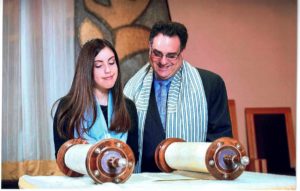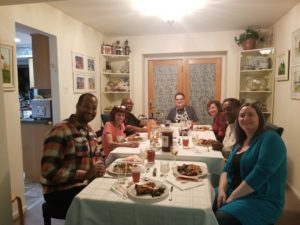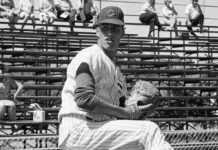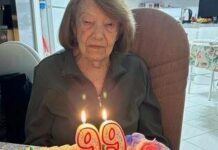
Former Ohev Shalom of Bucks County cantor and Jewish musician Paul Frimark died at his Langhorne home on Dec. 24. He was 69.
Frimark died from large B-cell lymphoma.
The Bucks County resident served as cantor of Ohev Shalom for 18 years but played in Jewish bands for longer than that. His groups, N’shamah and Shir Chadash, performed thousands of times between 1971 and 1998, according to a bandmate.
Frimark also was a devoted family man, leaving behind a wife of 39 years, Arlene Frimark, and two daughters, stepdaughter Kim Whitman and Bara Frimark. People who knew Frimark repeated the same theme about him. When someone dies, it’s easy to forget all of their negative characteristics. But with Frimark, there truly weren’t any to harp on.
“He was a first-class mensch. What you saw was what you got,” Ohev Shalom Rabbi Eliott Perlstein said. “He liked people.”
In the 1970s and ’80s, Frimark worked day jobs as an accountant, including as a controller for the Jewish Exponent at one point. But at night, he would lead his band around the region for gigs.
Frimark was a singer and keyboard player. He could both hear music and then play it back and read music.
The future cantor, though, didn’t just focus on the tunes. He served as band manager, booking agent and, as his friend and bandmate David Seltzer put it, “schlepper,” meaning he lugged the equipment around, too.
Through hustle and energy, N’shamah and then Shir Chadash grew into “the preeminent Jewish simcha band” in the Philadelphia area, according to drummer Fred Z. Poritsky.
The group played annually at the Soviet Jewry Rally at the Philadelphia Museum of Art and at the Israel Independence Day parade on Independence Mall. It also performed at weddings, b’nai mitzvahs and other Jewish celebrations.
By the end of its run, the band was traveling as far north as Massachusetts and as far south as Virginia.
Yet through it all, despite the extra work he did, Frimark insisted that band members take the same cut for their gigs.
“He was just completely selfless,” said Seltzer, who lives in Huntington Valley. “He could handle a multitude of tasks and personalities with a great deal of grace.”
Despite his band’s success, though, Frimark suffered from a midlife crisis about not fulfilling his childhood dream of becoming a cantor.
Already an Ohev Shalom member in the early 1990s, he was a regular part of a men’s group meeting with Perlstein. One night, the rabbi asked the men what dreams they had.
“Paul said to become a cantor,” Perlstein recalled.
At the time, Frimark’s musical ability made him qualified enough to fill in as cantor whenever Ohev Shalom needed someone. But Perlstein never knew the desire ran so deep.
“We had never had a conversation where he told me he wanted to become a synagogue cantor,” the rabbi said.
Just months later, Ohev Shalom’s cantor left, and Perlstein asked Frimark to fill in on an interim basis. He already knew all the Shabbat, holiday and High Holy Day melodies and thrived in the new role.
After a few months, Ohev brass made the no-brainer decision to bring Frimark on full-time.
From 1993 to 2011, he helped Perlstein lead services; he helped kids become bar or bat mitzvahs; and he helped run Ohev’s preschool.
According to the rabbi, the cantor handled between 60 and 70 b’nai mitzvah students per year. He was also “one of their best memories of preschool at Ohev Shalom,” Perlstein said.
“People had a world of respect for him as the cantor,” the rabbi added. “Nobody ever came to me and said, ‘I’m having a hard time with the cantor.’”
Frimark was a well-liked figure in both a leadership and performance role. Yet, according to Perlstein, he never sought the spotlight.
During Shabbat services, he sang and played the guitar and piano. But he always motioned for the congregation to start singing, too.
“It was never his goal to be the star,” Perlstein said. “He was more the leader of the congregation singing.”
Upon retiring in 2011, Frimark unretired.
Temple Judea in Doylestown lost its rabbi and needed a spiritual leader, so Frimark took over. He served in that role for three or four years before the synagogue hired a new rabbi.
“People will tell you he kept that synagogue alive,” Perlstein said.

At home, the cantor and band leader became the father and husband.
Bara Frimark said he tucked her in each night and the two would talk about their days. As an adult, whenever she had a question about money or taxes, she called her former accountant of a pop.
In August, he helped her refinance her house.
“I was definitely a daddy’s girl,” Bara Frimark said. “He was my go-to person whenever I needed help with anything.”
Arlene Frimark described her husband as a man who she just felt comfortable being around. The couple loved to travel to places like Lancaster, Nashville and New Orleans, among other locations.
Frimark also always helped his wife around the house, folding laundry and emptying the dishwasher. He did, however, have one character flaw after all.
Frimark didn’t cook, though he did make eggs.
Before his death, Frimark was homebound from the middle of October through Dec. 24.
“I’ll just miss him being there,” Arlene Frimark said.
[email protected]; 215-832-0740






